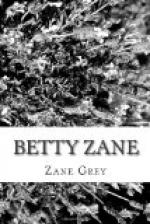“Good morning, Lew. Are you too off on a turkey hunt?” said Betty.
“Listen,” said the hunter, as he stopped and leaned against the gate. They listened. All was quiet save for the tinkle of a cow-bell in the pasture adjoining the Colonel’s barn. Presently the silence was broken by a long, shrill, peculiar cry.
“Chug-a-lug, chug-a-lug, chug-a-lug, chug-a-lug-chug.”
“Well, it’s a turkey, all right, and I’ll bet a big gobbler,” remarked Colonel Zane, as the cry ceased.
“Has Jonathan heard it?” asked Wetzel.
“Not that I know of. Why do you ask?” said the Colonel, in a low tone. “Look here, Lew, is that not a genuine call?”
“Goodbye, Harry, be sure and bring me a turkey,” called Betty, as she disappeared.
“I calkilate it’s a real turkey,” answered the hunter, and motioning the lad to stay behind, he shouldered his rifle and passed swiftly down the path.
Of all the Wetzel family—a family noted from one end of the frontier to the other—Lewis was as the most famous.
The early history of West Virginia and Ohio is replete with the daring deeds of this wilderness roamer, this lone hunter and insatiable Nemesis, justly called the greatest Indian slayer known to men.
When Lewis was about twenty years old, and his brothers John and Martin little older, they left their Virginia home for a protracted hunt. On their return they found the smoking ruins of the home, the mangled remains of father and mother, the naked and violated bodies of their sisters, and the scalped and bleeding corpse of a baby brother.
Lewis Wetzel swore sleepless and eternal vengeance on the whole Indian race. Terribly did he carry out that resolution. From that time forward he lived most of the time in the woods, and an Indian who crossed his trail was a doomed man. The various Indian tribes gave him different names. The Shawnees called him “Long Knife;” the Hurons, “Destroyer;” the Delawares, “Death Wind,” and any one of these names would chill the heart of the stoutest warrior.
To most of the famed pioneer hunters of the border, Indian fighting was only a side issue—generally a necessary one—but with Wetzel it was the business of his life. He lived solely to kill Indians. He plunged recklessly into the strife, and was never content unless roaming the wilderness solitudes, trailing the savages to their very homes and ambushing the village bridlepath like a panther waiting for his prey. Often in the gray of the morning the Indians, sleeping around their camp fire, were awakened by a horrible, screeching yell. They started up in terror only to fall victims to the tomahawk of their merciless foe, or to hear a rifle shot and get a glimpse of a form with flying black hair disappearing with wonderful quickness in the forest. Wetzel always left death behind him, and he was gone before his demoniac yell ceased to echo throughout the woods. Although often pursued, he invariably eluded the Indians, for he was the fleetest runner on the border.




